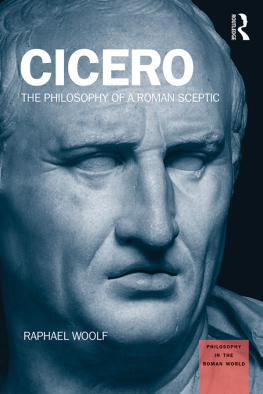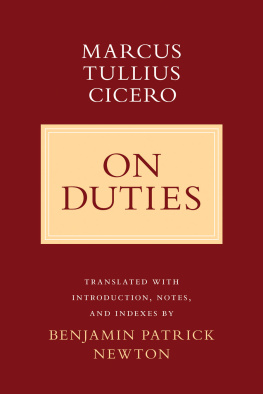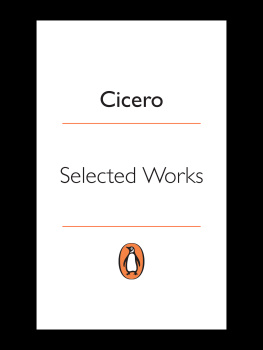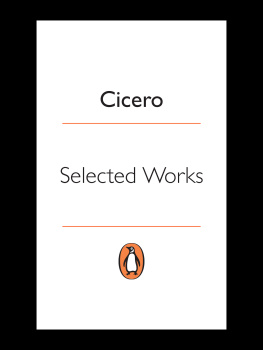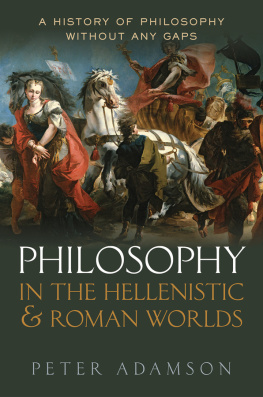CICERO
Ciceros philosophical works introduced Latin audiences to the ideas of the Stoics, Epicureans and other schools and figures of the post-Aristotelian period, thus influencing the transmission of those ideas through later history. While Ciceros value as documentary evidence for the Hellenistic schools is unquestioned, Cicero: The Philosophy of a Roman Sceptic explores his writings as works of philosophy that do more than simply synthesize the thought of others, but instead offer a unique viewpoint of their own. In this volume Raphael Woolf describes and evaluates Ciceros philosophical achievements, paying particular attention to his relation to those philosophers he draws upon in his works, his Romanizing of Greek philosophy, and his own sceptical and dialectical outlook. The volume aims, using the best tools of philosophical, philological and historical analysis, to do Cicero justice as a distinctive philosophical voice.
Situating Ciceros work in its historical and political context, this volume provides a detailed analysis of the thought of one of the finest orators and writers of the Roman period. Written in an accessible and engaging style, Cicero: The Philosophy of a Roman Sceptic is a key resource for those interested in Ciceros role in shaping Classical philosophy.
Raphael Woolf is Reader in Philosophy at Kings College London. His work focuses on ancient philosophy, and he has published on Plato, Aristotle and Hellenistic philosophy.
PHILOSOPHY IN THE ROMAN WORLD
Forthcoming:
Seneca
R. Scott Smith
Lucretius
Gordon Campbell
Galen
Teun Tieleman
Marcus Aurelius
John Sellars
Plutarch
Eleni Kechagia-Ovseiko
CICERO
The philosophy of a Roman sceptic
Raphael Woolf

First published 2015
by Routledge
2 Park Square, Milton Park, Abingdon, Oxon OX14 4RN
and by Routledge
711 Third Avenue, New York, NY 10017
Routledge is an imprint of the Taylor & Francis Group, an informa business
2015 R. Woolf
The right of Raphael Woolf to be identified as author of this work has been asserted by him in accordance with sections 77 and 78 of the Copyright, Designs and Patents Act 1988.
All rights reserved. No part of this book may be reprinted or reproduced or utilised in any form or by any electronic, mechanical, or other means, now known or hereafter invented, including photocopying and recording, or in any information storage or retrieval system, without permission in writing from the publishers.
Trademark notice: Product or corporate names may be trademarks or registered trademarks, and are used only for identification and explanation without intent to infringe.
British Library Cataloguing-in-Publication Data
A catalogue record for this book is available from the British Library
Library of Congress Cataloging in Publication Data
Woolf, Raphael.
Cicero : the philosophy of a Roman sceptic / Raphael Woolf.
pages cm
1. Cicero, Marcus Tullius. I. Title.
B553.W66 2015
186.2--dc23
2014034418
ISBN: 9781844658404 (hbk)
ISBN: 9781844658411 (pbk)
ISBN: 9781315724850 (ebk)
My interest in Cicero as a philosopher was first seriously awakened when I had the good fortune, some fifteen years ago, to be invited to collaborate with Julia Annas on a translation of Ciceros ethical treatise De Finibus, during which I benefited greatly from Julias knowledge and insight. That collaboration was made possible through the good offices of M. M. McCabe, who has remained a constant source of encouragement and advice. A number of scholars have helped me think about Cicero over the years. I would like here to thank in particular Will Altman, Charles Brittain, Christopher Gill, Margaret Graver, Brad Inwood, Jonathan Powell, Andrea Sangiovanni, Malcolm Schofield, David Sedley and Gisela Striker. Im grateful to an anonymous reader of an earlier version of the manuscript, who made several helpful suggestions for improvement. My thanks to Steven Gerrard, who commissioned the book, and to Matthew Gibbons and his team at Routledge for shepherding it through its final stages. Throughout the process of writing, Jane and mum have been unstinting sources of love and support. Finally, this book is dedicated to the memory of my father, Murray Woolf, who would have been proud; and to the memory of Ian Crystal, fellow ancient philosopher and friend, who would have been amused.
106 Cicero born on 3 January.
63 Cicero consul with Marcus Antonius. Exposes Catilines conspiracy. Has conspirators executed without trial.
60 Caesar, Pompey and Crassus form the First Triumvirate.
58 Cicero exiled.
57 Cicero recalled from exile. Returns to Rome in September.
56 First Triumvirate renewed.
53 Death of Crassus.
49 Caesar crosses the Rubicon, becomes dictator.
48 Caesar defeats Pompey at Pharsalus in August. Pompey is killed in Egypt in September.
45 Ciceros daughter Tullia dies, following childbirth, in February.
44 Caesar named dictator for life. Assassinated on 15 March.
43 Antony, Octavian and Lepidus form the Second Triumvirate. Cicero is killed on 7 December.
We probably know more about the life of Marcus Tullius Cicero (10643 BC), renowned statesman and orator of ancient Rome, than about any other figure in antiquity, largely because of the survival of many of his own speeches and other writings, including a treasure trove of letters. Less known, outside relatively specialist circles, is his devotion to the study and practice of philosophy. But his passion for the subject is something he acquired at a young age, and it stayed with him throughout his political career, serving as a source of guidance and at times solace during the upheavals that he lived through. Moreover, it is a passion reflected in his authorship of a number of philosophical works, most of which have survived, though not all of them intact.
To some extent it is understandable that his philosophical efforts have been overshadowed, at least from the point of view of his public persona, by his political profile. But any fair-minded assessment of Ciceros accomplishments must give credit to his remarkable contributions in both arenas. In fact, when it comes to his philosophical output Cicero is in a way the victim of his own success. Part of his ambition in writing philosophical works was to make available to a Latin-speaking audience the main ideas of the philosophical movements that were current in his own day, including but not confined to prominent schools of thought such as the Stoics and the Epicureans. The leading figures of these schools wrote in Greek, and by communicating their theories in Latin Cicero hoped to create wider interest in philosophy among a Roman readership.
Given the extent of Romes dominance even in Ciceros own day (let alone in the centuries-long imperial era to come after his death), he had reason to believe that his pioneering project to present philosophy in Latin would take hold. But the importance of what he was doing eventually outstripped what even he could probably have predicted. Due to the whims of history, virtually none of the works of philosophy written by the founders of, for example, Stoicism and Epicureanism survived into the modern period. We are reliant on the reports of later ancient authors for their main doctrines, and these reports tend themselves to be fragmentary, out of context, or hostile often enough, all three.
Because of this, the survival of Ciceros work takes on a particular importance. The fact that in many cases we do have complete or largely complete works of his, which often set out in some detail the views of one or other leading philosophical school, means that his philosophical writings have been of incalculable value in scholarly reconstructions of the philosophies of Stoicism, Epicureanism, Academic scepticism, and others. But this in turn has meant that the works themselves have perhaps not always been fully appreciated as examples of philosophical thinking in their own right. For understandable reasons, scholars have habitually mined the works for information about, say, Stoic ethics or Epicurean theology, while paying less attention to them as continuous, self-contained discourses by an author who aims to do much more than simply regurgitate existing views.
Next page
